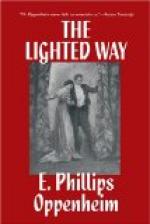“If Mr. Rosario were lunching with your wife,” Arnold pointed out, “it would be perfectly easy for her to get him to go somewhere else if she knew of the message, whereas he might have refused an ordinary warning.”
“You haven’t heard the motive even hinted at, I suppose?” Mr. Weatherley asked.
“Not as yet,” Arnold replied. “That may all come out at the inquest.”
“To be sure,” Mr. Weatherley admitted. “At the inquest—yes, yes! Poor Rosario!”
He watched the smoke from his cigar curl up to the ceiling. Then he turned to some papers on his table.
“Get your desk in, Chetwode,” he ordered, “and then take down some letters. The American mail goes early this afternoon.”
CHAPTER IX
A STRAINED CONVERSATION
Arnold swung around the corner of the terrace that evening with footsteps still eager notwithstanding his long walk. The splendid egoism of youth had already triumphed, the tragedy of the day had become a dim thing. He himself was moving forward and onward. He glanced up at the familiar window, feeling a slight impulse of disappointment when he received no welcoming wave of the hand. It was the first time for weeks that Ruth had not been there. He climbed the five flights of stone stairs, still buoyant and light-hearted. Glancing into his own room, he found it empty, then crossed at once the passageway and knocked at Ruth’s door. She was lying back in her chair, with her back toward the window.
“Why, Ruth,” he exclaimed, “how dare you desert your post!”
He felt at once that there was something strange in her reception of him. She stopped him as he came across the room, holding out both her hands. Her wan face was strained as she gazed and gazed. Something of the beautiful softness of her features had passed for the moment. She was so anxious, so terrified lest she should misread what was written in his face.
“Arnold!” she murmured. “Oh, Arnold!”
He was a little startled. It was as though tragedy had been let loose in the room.
“Why do you look at me like that, dear?” he cried. “Is there anything so terrible to tell me? What have I done?”
“God knows!” she answered. “Don’t come any nearer for a moment. I want to look at you.”
She was leaning out from her chair. It was true, indeed, that at that moment some sort of fear had drained all the beauty from her face, though her eyes shone still like fierce stars.
“You have gone, Arnold,” she moaned. “You have slipped away. You are lost to me.”
“You foolish person!” he exclaimed, stepping towards her. “Never in my life! Never!”
She laid her hand upon the stick which leaned against her chair.
“Not yet,” she implored. “Don’t come to me yet. Stay there where I can see your face. Now tell me—tell me everything.”




